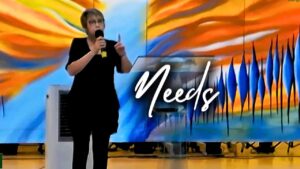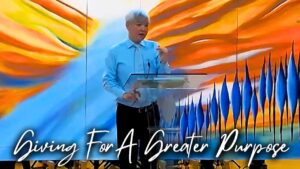Preached by:
Fernand D. Peralta
11 June 2017 @ Etab
PSALM 90
A Prayer of Moses the Man of God
1Lord, you have been our dwelling place throughout all generations.
2Before the mountains were born or you brought forth the whole world, from everlasting to everlasting you are God. 3You turn people back to dust, saying, “Return to dust, You mortals.” 4A thousand years in your sight are like a day that has just gone by, (God’s Time) or like a watch in the night. 5Yet you sweep people away in the sleep of death—they are like the new grass of the morning: 6In the morning it springs up new, but by evening it is dry and withered. 7We are consumed by your anger and terrified by your indignation. 8You have set our inequities before you, our secret sins in the light of your presence. 9All our days pass away under your wrath; we finish our years with a moan. 10Our days may come to seventy years, or eighty, if our strength endures; yet the best of them are but trouble and sorrow, for they quickly pass, and we fly away. 11If only we know the power of your anger! Your wrath is as great as the fear that is your due. 12Teach us to number our days, that we may gain a heart of wisdom. 13Relent, LORD! How long will it be? Have compassion on your servants. 14Satisfy us in the morning with your unfailing love, that we may sing for joy and be glad all our days. 15Make us glad for as many days as you have afflicted us, for as many years as we have seen trouble. 16May your deeds be shown to your servants, your splendor to their children. 17May the favor of the Lord our God rest on us; establish the work of our hands for us—yes, establish the work of our hands.
INTRODUCTION
A. Time Magazine’s Person of the Year—YOU
The thought of being in control of our life and effect our future brings us into an illusion of immortality and power; so real is the illusion that we miss out God’s reality and see a different one, that we fail to determine how the span of our human life ought to be lived, and that we become unmindful whether our Christian life bears an effective witness for Christ or, perhaps are we walking on thin ice?
B. Time for a Reality Check
Today I’d like to explore on perspectives, intentions, and God’s love in this message entitled TEACH US TO NUMBER OUR DAYS. And for the next 45 minutes, I’ll walk you through three major points:
(I) Relating to a Sovereign God: GET THE RIGHT PERSPECTIVE
(II) Numbering our Days: BE INTENTIONAL
(III) Understanding God’s Love: KNOW WHAT IS INSTORED
Our key text Psalm 90 is said to be the earliest of the psalms as, according to the inscriptions, it was written by Moses himself. Bible scholars believed it was very likely that Moses wrote Psalm 90 at the end of the wilderness wonderings, just before he died.
The inscription says it is “a Prayer of Moses the Man of God.” Imagine Moses alone in the presence of Yahweh, bearing the weight of the 40-year wilderness wonderings behind him and before him the toll of the 124-year existence and feeling his time to go would come very soon. Perhaps, closing his eyes, he recalls small and great moments in his life and reviews his relationship with God, his attitude toward life, and the way he lives every moment of it. Then God’s realities set in. He begins to utter his prayer, which we now come to know as Psalm 91, declaring God’s greatness that goes beyond history and time, positioning human life within His sovereignty, and crying out for God to remember his covenant. His honest prayer contains important truth all of us can use to be able to live our lives well. After all, isn’t that what we all want—to live well?
As I studied Moses’ prayer, God revealed to me the error of my ways and my thoughts and showed me the way to deal with the recent struggle I am in. Thus, this message.
THESIS: This entire message points to this one humble realization: When you and I get the right perspective of God’s sovereignty and learn to position ourselves in His overall design/purpose, we can learn to live wisely—pursuing an intentional life—and experience God’s compassion—the blessings that a life well-lived brings.
Is your life lived within the sovereignty of God? Do you find yourself struggling with decisions that involve you and God?
Do you think you have lived your days wisely? Is God pleased with how you spend your time or how you use your gifts for His glory?
Does your life exhibit the character of a life well-lived? Have you missed out on the blessing of a life well-lived?
If you can’t quite put a finger on these questions, then we are on the same boat. But this morning, allow the word of God to shine His light on our clouded minds and heavy hearts so we can make up our minds and come to a resolution—one that is glorifying to God.
How?
I. RELATING TO A SOVEREIGN GOD (Ps 90:1-11)
GET A PERSPECTIVE
In the first 11 verses of this psalm, Moses declares the encompassing greatness of God and marvels at the relationships of God to man. Here Moses is careful to POSITION God in his life—that is, simply who God is to His people corporately all this time and to him individually all his life. He gets intimate and personal as he relates to the PERSON of God. Considering his wilderness experience, his personal encounters and private conversations with God, his actions and responses in every situation, etc. and identifying who God is in all these, Moses is able to get the right perspective of God, who, as he declares, is all SOVEREIGN.
Moses, subsequently, shows us how we ought to relate to the sovereign person of God. If we adopt this perspective and understand this attribute, we can learn to live wisely. I’d like to bring up to you three important sub points: (A) God as Man’s Dwelling Place, (B) Human Life within His Sovereignty, and (C) God’s Wrath for Man’s Sin.
A. God as the Dwelling Place of Man (v.1-2)
1Lord, you have been our dwelling place throughout all generations.2Before the mountains were born or you brought forth the whole world, from everlasting to everlasting you are God.
In the first verse Moses exclaims his ultimate realization: ‘God is the Dwelling Place for all generations.’ The metaphor ‘dwelling place’ suggests comfort, belongingness, provision, security, rest, delight, peace, and home. HOME. God is positioned as the home for man throughout all generations since human race began. In fact, Bible commentator Ray Stedman asserts that if we search for the history of man, our search would ultimately lead us to God.
God as a ‘dwelling place’/’a home for man’ means God and ONLY He is our true provision, true security, true rest, true delight, true peace, true confidence. He was, has been, and will always be our home even for generations to come. Our world may have changed, our times may have been complicated, our human needs may have become varied, layered, and complex, but God remains to be our dwelling place/ home to eternity. Apparently, this truth Moses had proven throughout his life journey, and he couldn’t help but relate to His greatness.
Come to think of it. If God were not our home, then where are we? who are we? what are we here for? For it is in God that we find identity, meaning, and significance as apostle Paul declared in—
Acts 17:28
For in Him we live and move and have our BEING.
Apart from this ‘home’ (God), there is nothing but a sense of “lostness” and “empty living”.
As I further meditated on the ‘dwelling place’, another important truth that God revealed to me is that the dwelling place is the PRESENCE (character & power) of God. Let me co-reference this to Psalm 91:1 in which the psalmist affirms—
Psalm 91:1
Whoever dwells in the shelter of the Most High will rest in the shadow of the Almighty.
To ‘dwell in the shelter of the Most High’ suggests “living in the presence of God”. And to live in God’s presence means being blanketed (‘rest in the shadow of the Almighty’) by his character and power that come with His presence. This is God’s reality. In the dwelling place, we need to relate to God’s reality. On God’s part, consider what He will do when we realign our lives according to His reality:
Psalm 91:14-16
“Because he loves me, says the LORD, “I will rescue him; I will protect him, for he acknowledges my name. He will call on me and I will answer him; I will be with him in trouble, I will deliver him and honor him. With long life I will satisfy him and show him my salvation.”
Just look at that! The presence of God in action! With all these dynamic verbs, God is resolved (‘will”) to do these concrete actions if we abide in Him. When we relate to God as our home/dwelling place, we rest in His presence—His character and power [as Pas. Lily preached last Sunday]. That is why it is necessary for us to practice the presence of God for it is good for our soul. At the recent Bible Study Pastor Lily emphasized: The soul thrives only through simply being with God. For to practice the presence of God is to fill every moment of our lives with conscious awareness of and surrender to God’s presence. She further concluded “Your soul will never find rest until it finds its home—the presence of God.”
REFLECTION: This is God’s reality, His sovereignty. If we want to live wisely, we need this perspective of God and relate to Him as our only dwelling place—our home (Apart from Him we can never really go far in life.)
But let’s ask ourselves today: Who is your dwelling place today? A saying goes “Home is where your heart is”. Who or what do you consider your home? Many of us may have been in church for the most part of our lives, but God may not be our ultimate dwelling place. Or perhaps for others, something snapped in our lives and we allowed our heart to search for a different home. Today, you can get your perspective right.
As if the “dwelling-place-for-all-generation” metaphor was not enough, Moses in the following verse flashbacked in time and related to the awesome greatness of God—
2Before the mountains were born or you brought forth the whole world, from everlasting to everlasting you are God.
Here, Moses perhaps is blown away as his mind gets a much clearer perspective of a much greater reality of God—that he is relating to the God of Creation and God of Eternity. Moses must be awe-struck as his imagination picks up images of a God making the very earth he’s stepping on, of One who exists even before time began (God’s timelessness—‘from the vanishing point in the past to the vanishing point in the future’ in Hebrew meaning). With this reality, Moses positions human life rightfully. He gets the right perspective of how sovereign his God is.
REFLECTION: Sometimes we need to be awe-struck or OVERWHELMED by the truth that we are serving the God of history, God of creation, God of eternity—the Great I Am. When we have a perspective of the greatness of God, we can see our humble state (as sinners saved by grace) and we can position our lives in God’s plan and purpose. We are a speck in His universe, but God shed Jesus’ blood to make us His children His inheritance.
Who is God to you? How do you position yourself with God? Like me, have you gotten used to positioning God as Love, forgiving Father, faithful friend, guide, etc.? How about the sovereign person of God? In the light of His Kingdom purpose, how do you come in? You need to get your perspectives right. Be engaged.
Having a perspective of a sovereign God can help us to REALIGN our lives back to God, to correct strayed thoughts and ideologies, to straighten attitudes and characters flaws, to be intentional in our service, etc. as we seek to have a personal and honest relationship with Him.
B. God’ Sovereignty Over Man (v. 3-6)
In the next four verses Moses extends the sovereignty of God over human life and existence. God sets the limits of life for man.
3You turn people back to dust, saying, “Return to dust, You mortals.”
4A thousand years in your sight are like a day that has just gone by,
or like a watch in the night.
5Yet you sweep people away in the sleep of death—they are like
the new grass of the morning:
6In the morning it springs up new, but by evening it is dry and
withered.
In verse 3 God wields the power over Life and Death as He does Time. God controls human life. This sovereignty of God over the span of our existence is a bitter pill to swallow for we humans grow up to have control of our life and surrounding. Our minds fed by worldly views of media, we thrive on our ability to change, direct the future, and instantly gratify our needs. But, God sets our human limitations.
There are certain things God will not let us do. TIME—it is one thing that is reserved from man’s understanding (time and season are not for you to know) In v.4-5 time limits human life.
TIME (Man) vs ETERNITY (God)
Pondering on verse 4, we may wonder how long God had originally intended for man to live. The Book of Genesis records the oldest man ever lived lived to 969 years, but the longest possible lifetime of man compared to God’s timelessness is but “…a day that has just gone by…”. In verse 5 God can just “…sweep people away in the sleep of death…” [Just like that] It is apparent that our existence is within His sovereignty. History confirms to us that men can disappear from the picture very suddenly. Our fleeting life is just likened to grass, there in the morning and gone in the evening—what a befitting picture of human life.
REFLECTION: Oftentimes because we are blinded by the “worldly reality” and “self-reality” that the media and the current world system feed us, we live as though we had our lives on our hand and the universe at our disposal. Just because we pray/fast for something fervently, we expect God to give in…according to our own timing on our own terms. We lose sight of the fact that our Christian life is within the sovereignty of the Life-Giver. Take a pause and have a reality check.
Do you live within the sovereignty of God? Or do you often find yourself challenging His will, struggling with His purpose in your life, or questioning His timing? When we succeed in positioning our life within God’s sovereign rule and time, we can live every passing moment wisely.
Testimony: God Giveth and God Taketh Away: Story of my CHED scholarship
C. God’s Ever-Present Justice (v.7-11)
In verses 7-11, Moses relates man’s fallen nature to God’s ever-present justice.
7We are consumed by your anger and terrified by your indignation.
8You have set our inequities before you, our secret sins in the light
of your presence.
9All our days pass away under your wrath; we finish our years with
a moan.
10Our days may come to seventy years, or eighty, if our strength
endures; yet the best of them are but trouble and sorrow,
for they quickly pass, and we fly away.
11If only we know the power of your anger! Your wrath is as great
as the fear that is your due.
Moses, here, is getting his perspective of a just God right. He speaks of man being consumed by the anger or wrath of God which is God’s moral integrity (He can’t stand sin; He must deal with sin). For the cause of God’s wrath is always human sin. His anger comes because of our SECRET SINS that are exposed in the light of God’s countenance. God knows our secret sins…secret inner thoughts—thoughts that we harbor, mull over and play with, thoughts that we take great pleasure in…God is aware of these INNER DEFILEMENTS OF LIFE.
Sin reduces the length of man’s life (‘to seventy years and if by reason of strength we reach eighty’), but no matter how long men live, his days are filled with trouble and the tragic quality of life that marks the wrath of God. Moses himself faces the fact that God allows His wrath, His moral integrity against sin, to be manifest precisely because it affords Him opportunity for the exercise of His love.
REFLECTION: A sovereign God has control not only over our human activities but also over our thought life—our inner thoughts (or even our motivations). What are some of these inner defilements/secret sins in our lives that will invite God’s anger? Apply the sovereignty of God to your thought life.
Testimony: Escape plan constructed in the mind
Transition: We often ignore the fact of the wrath of God. We try to pretend it does not exist. And this brings us a lot of trouble—for one, it distances from God; there is an absence of God in our life. We need to regain a right perspective of a sovereign God. We ought to relate to God as our ultimate dwelling place, to the sovereignty of God over life, and to the ever-present justice of God. See God’s reality and live it.
[How then should we live our lives as we relate to a sovereign God? Moses captures it in verse 12 in our second major point.]
II. NUMBERING OUR DAYS (Ps 90:12) BE INTENTIONAL
12Teach us to number our days, that we may gain a heart of wisdom.
This verse is the most important part of Moses’ prayer as it expresses a humble response to the greatness of God—an honest positioning of human life. Moses pleads, ”Teach us to number our days…”
EXERCISE: How many days do you have until you reach seventy?
(365 days x number of years + days before your next birthday)
In my case, I have 12,506 days.
Critical Question: If I had only one year to live, how should I order my days?
When we number our days, we make ourselves MORE AWARE of the limitations of life and the magnitude of the sovereign person of God. When we learn to properly number our days, our perspective and position change—we can come to a resolution to be INTENTIONAL with how we use our time and live our days.
Numbering our Days
Draw us to attentiveness and give us the opportunity to resist the inclination to drift thoughtlessly
Force us to confront universal and irreducible truths: Life is short. Contemplating the end of life—this reality leads to a peaceful and settled urgency. It reminds us that our short stay on earth is our only chance to honor Him with faith and faithfulness—gaining a heart of wisdom.
Ps 39:4-6
4Show me, Lord, my life’s end and the number of my days; let me know how fleeting my life is. 5You have made my days a mere handbreadth; the span of my years is as nothing before you. Everyone is but a breath, even those who seem secure. 6Surely everyone goes around like a mere phantom; in vain they rush about, heaping up wealth without knowing whose will it finally be.
We should number our days not to increase our pace but to examine our path, not to increase our efficiency but to see where we must make corrections in heart, character, and actions (to fine-tune our focus) that can help us move wisely into the future.
When we number our days (as life on earth has a shelf life—an expiration date), we ensure each day is filled with sharp significance. When we breathe our last, how will God assess the days allotted us? Every breath is a gift; we make each one count.
Our view of time will enable us to live our earth-years well. Whatever time we have left is a gift, a responsibility, a stewardship.
Numbering our days involves contemplating the future with eternity in sight:
sharpens spiritual sensitivity, warms affections, sanctifies imagination, nourishes the weary and fainting soul, quickens the conscience, helps connect practical life to the greater vision and calling, sustains hope, and balms injury and sorrow.
Paul instructs us to set your hearts/minds on things above:
Col 3:1-3
1Since, then, you have been raised with Christ, set your hearts on things above, where Christ is, seated at the right hand of God. 2Set your minds on things above, not on earthly things. 3For you died and your life is now hidden in with Christ in God.
Heavens perspective is meant to touch earth, to defeat nonchalance.
The Example of Jesus
Jesus’ life in heaven informed His life on earth. Eternity shaped time. He lived in time (earth) with clarity and perspective because he knew what came next. For the joy set before him, the perfection of heaven, the Father’s approval, and countless redeemed souls, he endured the cross. Eternity nourished his endurance. The joy of his sure future supported him in his agony.
Transition: “Teach us to number our days, that we may gain a heart of wisdom.” Heart of Wisdom refers to a realistic outlook on life that can help us live well. It is facing life the way it is and fully relating with the sovereignty of God over our lives.
III. WHAT THE LOVE OF GOD BRINGS (Ps 90:14-17)
KNOW WHAT’S INSTORED
Moses cries out for God’s compassion. This compassion comes with “gaining a heart of wisdom.” So what is in stored for us when we live wisely?
13Relent, LORD! How long will it be? Have compassion on your servants. 14Satisfy us in the morning with your unfailing love, that we may sing for joy and be glad all our days. 15Make us glad for as many days as you have afflicted us, for as many years as we have seen trouble. 16May your deeds be shown to your servants, your splendor to their children. 17May the favor of the Lord our God rest on us; establish the work of our hands for us—yes, establish the work of our hands.
What does this love of God bring?
Satisfying Love (v14) or the “steadfast love” of God (RSV)
We can experience a satisfying love/steadfast love—a love that does not change…love that satisfies…love that does not depend on whether we good or bad but is ready to receive us and forgive us and set us back on our feet again (love that will not let us go).
Recompensing Joy (v15)
We can experience a kind of joy that makes up for the past.
This recompensing joy can restore the years which the “locusts have eaten” –the wasted years of our life. God is correcting what once looked like a hopeless/ wasted situation.
Manifestation of God’s Splendor (v17) or “beauty”(RSV)
We can encounter the splendor or glory of God—the character of God. As we practice the presence of God, our life will express the character of God.
In RSV “splendor” is “beauty”, and beauty is Godlikeness or godliness
What is the “beauty of God”? God is beautiful because of two things—truth and love. (Truth is necessary to beauty. Love is warmth, graciousness, and attractiveness + truth constitutes beauty). In the understanding of life, according to the Bible, this beauty we can find in God.
A man or a woman whose life is characterized by truth and love is a beautiful person. Now that is “beauty” redefined.
Work of Our Hands Established
The result of God’s love is to make our work or ministry meaningful, valuable, and enduring. It will not be wasted, frenetic (wild or frantic), spent in a moment. The work of our hands becomes an enduring thing, impressive, affecting others, having in itself great value. It will bless others.
REFLECTION: The blessing of a life well-lived. Who does not long for this? Do you long that your life will be worthwhile?..that you will be the kind of person who will be worth something…that others will value you and your life? We need this love of God that comes with a life surrendered and lived within the sovereignty of God.
CONCLUSION
Is your life lived within the sovereignty of God?
GET THE RIGHT PERSPECTIVE.
Realign your life with a Sovereign God for He is your constant dwelling place, He has control over your life, and He exercises ever-present justice.
Is God pleased with how you spend your time or how you use your gifts for His glory?
BE INTENTIONAL.
Learn to number your days by being aware of your limitations, making corrections in heart, character, and action to move wisely in the future, filling every moment with sharp significance for God, and spending time and life with the perspective of heaven.
Have you missed out on the blessing of a life well-lived?
KNOW WHAT IS INSTORED.
Encounter the blessing of gaining a heart of wisdom: Satisfying love, recompensing joy, manifestation of God’s splendor, and work of our hands established.
When you and I get the right perspective of God’s sovereignty and learn to position ourselves in His overall design/purpose, we can learn to live wisely by pursuing an intentional life, and experience God’s compassion—the blessings that a life well-lived brings.
Like Moses, let us begin by crying out: Return, O Lord. Come back into my life and work through me.





